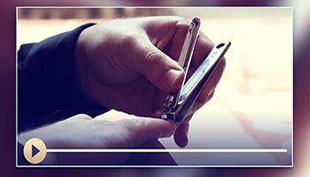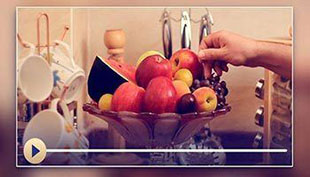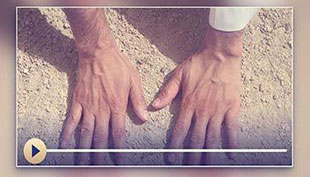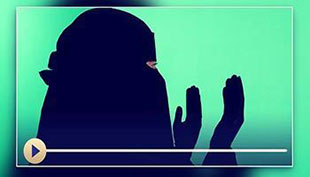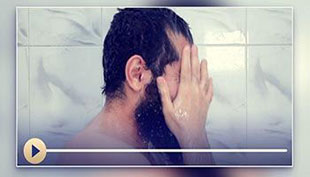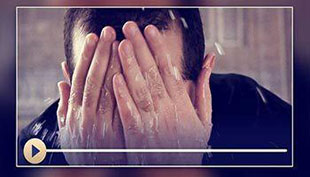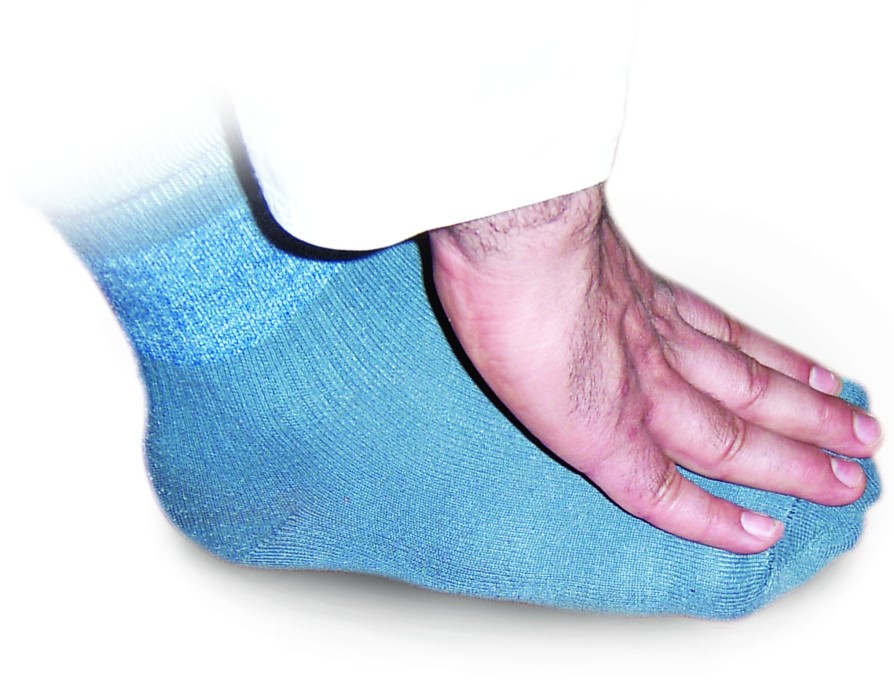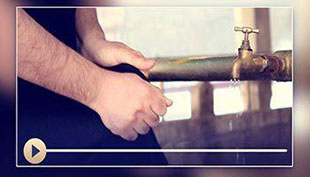Goodness and cleanliness.
How to perform Wudu (ablution)?
Using water on the limbs of the body with the intention of purification.
The Rulings of Wudu’
Al-wudu’ is either obligatory or recommended.
a- There are three things for which al-wudu is obligatory.
1- As-Salah (Prayers)
Allah (exalted be He) said: “O you who believe, when you intend to offer As-Salah (prayers), wash your faces and your hands up to the elbows, rub your heads, and wash your feet up to (and including) the ankles.” (Al-Ma’idan:6).
2- Circumambulation of Ka’bah.
This is because the Prophet ﷺ said to a menstruating woman: “Do not perform Tawaf until you have taken a purificatory bath.” [ narrated by Al-Bukhari.]
3- Touching the Noble Qur’an:
Allah the most Exalted says: “None touch it (The Noble Qur’an) except the purified” (Waqiah:79)
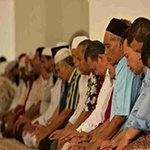 Al-Wudu’ for As-Salah
Al-Wudu’ for As-Salah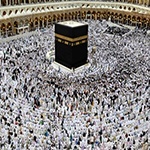 Al-Wudu’ for Circumambulation
Al-Wudu’ for Circumambulation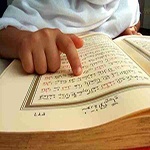 Al-Wudu’ for Touching the Qur’an
Al-Wudu’ for Touching the Qur’anb- Al-wudu’ is recommended for other purposes.
The Prophet ﷺ said: “No one constantly stays in a state of al-wudu’ except a believer.” [ narrated by Ahmed.]
Renewal of al-wudu’ for each Salah (even if it has not been previously invalidated). Also al-wudu’ is strongly recommended during the remembrance of Allah, during supplications, before reading the Qur’an, before sleep, before bathing, after carrying the dead, and after using the toilet even if one has no intention of observing Salah.
- What is meant here with bathing is pouring water over the entire body, after any impurity has been removed prior to making wudu’. This order:
1- removal of any impurity
2- making wudu’
3- pouring water over the entire body, was the way of the Messenger of Allahﷺ.
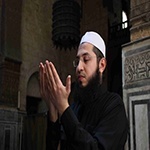 For Invoking or Remembrance of Allah
For Invoking or Remembrance of Allah Al-Wudu’ before Sleeping
Al-Wudu’ before Sleeping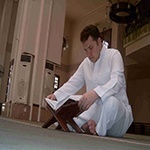 Al-Wudu’before reading the Qur’an
Al-Wudu’before reading the Qur’an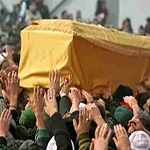 Al-Wudu’ after Carrying a Corpse
Al-Wudu’ after Carrying a CorpseMerits of Al-Wudu’
1- A Means of Attaining the Love of Allah:
Allah (the exalted) says: “Truly Allah loves those who turn to Him in repentance and loves those who purify themselves.” [Baqarah: 222]
2- A Mark of Distinction of the Prophet’s ﷺ nation, on The Day of Judgment:
The Prophet ﷺ said: “My nation will come forth on the day of judgment like ‘Ghurrah Muhajjaleen’ (horses with white forelocks and white feet)[ Al-Ghurru: is the white patch on the forehead of the horse. Muhajjaleen: are horses with white feet. At-Tahjeel: White patches on their limbs. This refers to the light on the Day of Judgment that will be on the parts of the body that used to be washed during al-wudu’.] as a result of making Al-wudu’. So any of you (who is) capable of lengthening his ghurrah (places of light) should do so.” [ agreed upon.]
3- Expiation of Sins and Misdeeds:
The Prophet ﷺ said: “He who performs the wudu’ perfectly (i.e., according to Sunnah), his sins will depart from his body, even from under his nails.” [ narrated by Muslim.]
4- The Elevation of Ranks:
The Prophet ﷺ said: “Should I tell you that by which Allah erases the sins and elevates the ranks (of man).” They (the companions) said: “Yes, O Messenger of Allah.” Then he said, “Performing the wudu’ thoroughly despite whatever odds,[ Odds: here means hardships and conditions disliked by men.] to make many steps towards (to walk from a far distance to) the masjid (mosque), and waiting for the next obligatory prayer after observing a prayer. That is (when you are) steadfastness.” [ narrated by Muslim.]
Description of Al-Wudu’
1- Making the intention in one’s heart.
2- Saying: “Bismillah”
3- Washing the hands to the wrists (3 times).
4- Using the Siwak (when rinsing the mouth).
5- Rinsing the mouth and taking water into the nose, then gently blowing it out.
Al-Madhmadha: means rinsing the mouth out with water. Al-istinshaq: means rinsing the nasal passages by sniffing water into the nostrils. Al-Madhmadha and Al-istinshaq are done with a single handful of water i.e. at the same time. Al-Istinthar means blowing water out of the nose.
6- Washing the face (3 times) and running ones wet hands through the beard. The limits of the face vertically are from the hairline to the chin and horizontally from ear to ear.
7- Washing of the right arm from the tip of the fingers to (and including all of) the elbow (3 times) and then the left arm in the same manner.
8- Wiping of the head: One wets one’s hands with water and then passes them over the head. (once).
9- Wiping of the inner part of the ears with the index fingers and the outer part with the thumbs (once), straight after wiping the head, with the remaining water on one’s palms and without wetting one’s palms again.
10- Washing the right foot up to and including the ankle, three times, and then the left one in the same manner.
11- Supplicating on completion of al-wudu’ by saying: “Ash-hadu an la ilaha illallahu wah da hu la shareeka lahu; wa ash-hadu anna Muhammadan ‘abduhu wa Rasuuluhu.” [ narrated by Muslim.]
(Meaning: “I bear witness that there is no God worthy of worship, but Allah alone. He has no partner. And I bear witness that Muhammad is His servant and Messenger.) And “Allahummaj’alnee minat-Tawwa-been waj ‘alnee minal mutatahhireen.” [ narrated by At-Tirmidhi.]
(Oh Allah, make me from those who often repent to you and make me from those who purify themselves). And “Subhanaka Allahumma wa bi hamdika, ashhadu an la ilaha illa Anta, astaghfiruka wa atoobu ilaik”. (Meaning: Glorified be You, Oh Allah, and praises be unto you; I bear witness that there is no God worthy of worship but you. I seek your forgiveness and turn to you in repentance.)
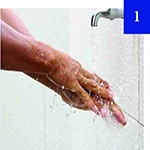 Washing The Hands (3 times)
Washing The Hands (3 times)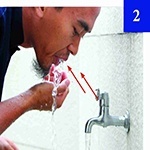 Rinsing The Mouth (3 times)
Rinsing The Mouth (3 times)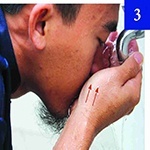 Inhaling Water (3 times)
Inhaling Water (3 times)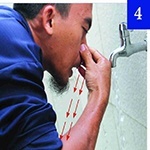 Exhaling It Out (3 times)
Exhaling It Out (3 times)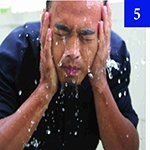 Washing The Face (3 times)
Washing The Face (3 times)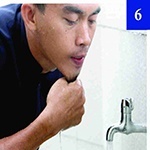 Running Ones Hand Through The Beard
Running Ones Hand Through The Beard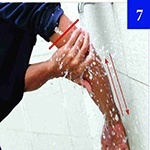 Washing The Arms
Washing The Arms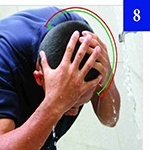 Wiping The Head
Wiping The Head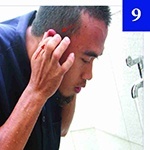 Wiping The Inside of The Ears Once
Wiping The Inside of The Ears Once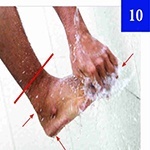 Washing The Feet to The Top of The Ankles
Washing The Feet to The Top of The AnklesThe Conditions for Al-Wudu’
1- The water to be used must be pure.
2- The water should be lawful. It should not be stolen water, for example.
3- One has to remove anything that might prevent water from reaching the skin, like grease or any other oily substances etc.
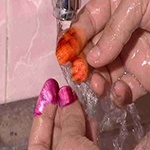 Removal of Paint
Removal of PaintObligations of Al-Wudu’
1- Intention: Intentions are made in the heart and are not to be pronounced out loud, i.e. audibly. If al-wudu’ is done for a purpose other than purification for worship, such as cooling off or cleaning the body, then it is not valid to perform worship with it.
2- Washing the face. Al-Istinshaq is part of washing the face.
3- Washing of the hands and forearms, including the elbows.
4- Washing of the feet and ankles.
5- Rubbing the head entirely (this includes the ears).
6- Washing these parts one after the other in the order mentioned above.
Recommended acts of Al-Wudu’
1- Washing of the hands three times before al-wudu’.
2- Using As-Siwak.
3- Washing the limbs three times, except the head and ears, which are to be wiped once
4- Starting from the right.
5- Lengthening the ‘place of light’, meaning that one should wash above the elbow and the ankles when permforming wudu’.
6- Parting the beard with the fingers so that water can reach the skin of the face beneath it.
7- Rubbing water in between the fingers and toes.
8- Rubbing water evenly and thoroughly over the body parts to be washed and not just pouring water over them.
9- Being conservative with the use of water. The Prophet ﷺ said: “Verily there will be from my nation those (followers) who exceed the bounds in wudu’,” [ narrated by Abu Dawud] - i.e. they will waste water when making wudu’.
10- Supplicating after wudu’. The Prophet ﷺ said, “There is not one of you who completes al-wudu then says ‘Ash hadu a la ilah illallah wahdahu la shareeka lahu wa ash hadu anna Mudammadan abduhu wa rasulahu, Alluhamma ij-alnee min at-tawwabeen wa ij-alnee min al-mutatahireen’ except that the eight doors of paradise are opened for him, and he can enter from any door he chooses (on the day of judgment).”[ narrated by At-Tirmidhi.]
11- Praying two raka’a after making wudu’. The Prophet ﷺ said, “Whoever makes wudu’ like I make wudu then stands and prays two raka’as of prayer without letting his thoughts wander, his past sins will be forgiven.” [ agreed upon.]
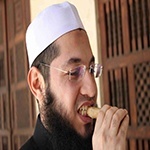 Using the Siwak
Using the Siwak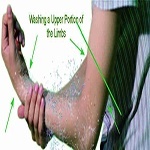 Washing the Upper Portion of the Limbs
Washing the Upper Portion of the Limbs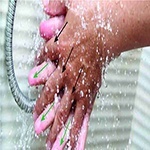 Washing Between the Fingers
Washing Between the FingersInvalidators of Wudu’
1- Anything discharged from the two passages - the urinary tract and the anus, e.g. urine, feces, wind. The Prophet ﷺ said: “Allah will not accept the Salah from any of you when he is (ritually) impure until he performs wudu’.” [ narrated by Muslim.]
2- Deep sleep or losing consciousness. Included in this category is fainting or loss of consciousness due to anaesthesia etc.
3- Eating camel meat. This is in accordance with the hadeeth of Ja’bir Ibn Samrah who said: “A man came to the Noble Prophet ﷺ and asked: ‘Do I perform wudu’ after eating camel meat?’ He (the Prophet) replied: ‘Yes.’ ” [ narrated by Muslim.]
4- Touching the private parts directly without any covering. According to the hadeeth of Busrah bint Safwan (may Allah be pleased with her) where she said, she heard the Prophet ﷺ saying: “Whosoever touches his private parts should he performs wudu’.” [ narrated by Abu Dawud.]
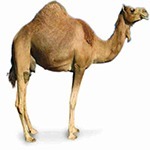 Eating Camel Meat
Eating Camel Meat Deep Sleep
Deep SleepPoints for Discussion
1- Whenever a Muslim rises from sleep and wishes to perform wudu’ from water in a bowl, he should wash his hands three times and then make wudu’ with new/different water. This is according to the saying of the Prophet ﷺ: “Whenever any of you rises from sleep, he should not dip his hand(s) into the bowl (of water) until he has washed them three times (outside the bowl), certainly he does not know where they (his two hands) ‘slept’,” [ agreed upon.] i.e. where they were while he was asleep.
2- It is mandatory to ensure that water touches all the parts of the body which are obligatory to wash, especially between the toes and fingers, ears and beard as well as the elbows, ankles and the heel. The Prophet ﷺ said: “Woe unto the heels (untouched by water) from the hellfire.”[ narrated by Muslim.]
3- The fundamental principle regarding At-Tahara, is that it’s established on a certainty. Thus, if one was sure one was in a state of purity, but now he doubts whether his wudu’ was nullified after that time, then he should base his conclusion on what he is sure about, i.e. he should presume that he is in a state of purity. Likewise, if he was sure he was not in a state of purity, then he doubts whether he had performed wudu’ afterwards or not, what he is sure of is that he was without wudu’, so he should therefore perform wudu’.
4- When a Muslim performs wudu’ and washes the parts of wudu’ either once or twice each, or some parts once, and others twice and thrice, his wudu’ is correct.
5- Whosoever forgot and prayed without wudu’ must repeat the Salah (prayer) whenever he remembers.
6- Whosoever performed wudu’ and subsequently is stained with an impurity should just remove the impurity, however it does not oblige him to renew his wudu’. This is because such is not a hadath (urinating, defecating, etc.) that nullifies wudu’.
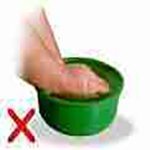 Dipping Hands into a Bowl after Rising from Sleep
Dipping Hands into a Bowl after Rising from Sleep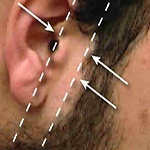 Between the Beard and the Ear should be washed
Between the Beard and the Ear should be washed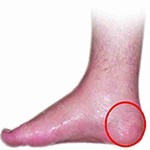 The Heel
The Heel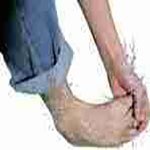 Rubbing between the Toes
Rubbing between the ToesWudu’ and General Health
“In an article published in the Source Magazine (published by the United Nations (UN)), the author stated that: “The organised washing and wudu’ for prayers observed by Muslims helps protect many from the spread of ‘trachoma’, which is suspected to be the main cause of blindness in the third world countries. Close to 500 million suffer from this disease in different parts of the world. It is possible to prevent this disease through adherence to Islamic ways of strict cleanliness prescribed upon each Muslim before prayers. It has been noticed in strict Islamic communities that the risk of contracting this disease is either at a low level, or non-existent.”[ Prophetic Medicine in the Light of Modern Science by Giyath Al-Ahmad”]Imperfections in the performance of wudu
It was narrated that a man performed wudu’ but left a patch around his feet unwashed. When the Prophet ﷺ saw this, he said: “Return and perfect your wudu’.” Then he (the man) returned and thereafter prayed. [ narrated by Muslim.]
Imperfections in Wudu’ Include:
1- Not washing the ankles.
2- Not washing the elbows as a result of tight cloths.
3- Not washing the part between the ears and beard.
4- Not washing the left palm together with the back of the left hand.
5- Performing wudu’ while having grease on the parts to be washed which is enough to stop the water from reaching the skin.
6- A female performing wudu’ when she has some form of beautification on her hands that prevents water from touching the skin.
7- Not rubbing between the fingers and the toes when water doesn’t go smoothly between them.
8- Wiping the neck. This is not part of wudu’ but when the need arises it should be done before or after wudu’.
9- Reading unislamic supplications like those specific to washing each limb, or like saying “zamzam!” to someone who has performed wudu’.
Disliked
1. To voice out the intention for wudu’
2. To waste water
3. To wash more than three times. It was narrated that a bedouin Arab came to the Prophet ﷺ and asked him concerning wudu’. The Prophet then showed him how to perform wudu’ by washing (each part) three times and then He said: “This is (how to perform) wudu’, whoever goes beyond this has done bad, transgressed and has acted unjustly.” [ narrated by Abu Dawud.]
However, it is permissible to exceed three times when a part is not clean after washing it three times, e.g. for a person with grease-stained hands.
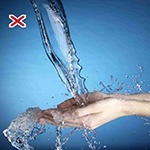 Wasting Water
Wasting Water






 Wiping over socks, c...
Wiping over socks, c...
 The Practices of Al-...
The Practices of Al-...
